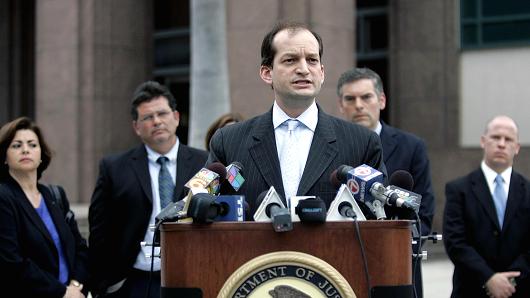
via CNBC
A controversial rule that requires financial advisors to work in the best interests of their clients will go into effect next month as scheduled, Labor Secretary Alexander Acosta said.
Despite efforts to delay it further, the so-called fiduciary rule will get put in place June 9, Acosta wrote in an op-ed for the Wall Street Journal. However, analysts believe there will be more changes to come before full implementation takes effect.
The rule has come under criticism for limiting investor choice and likely increasing costs for the financial advisory industry. The administration already delayed the rule once past its original April 10 implementation date, but apparently has decided to go ahead with the first steps.
“We have carefully considered the record in this case, and the requirements of the Administrative Procedure Act, and have found no principled legal basis to change the June 9 date while we seek public input,” Acosta wrote. “Respect for the rule of law leads us to the conclusion that this date cannot be postponed.”
President Donald Trump had ordered a sweeping review of regulations under former president Barack Obama that included the fiduciary rule.
Advocates for the rule believe it will help retirees by eliminating hidden costs and provide more disclosure. However, advisory heavyweights like BlackRock and Vanguard have warned of unintended consequences. BlackRock recently called for a 12-month delay in implementation until the rule is better crafted.
Industry advocates estimate lost revenue of more than $10 billion and a possible shift of $2 trillion in assets for the $16 trillion industry.
Acosta conceded weaknesses in the rule but said the courts have spoken. A Texas court recently upheld the rule.
“Although courts have upheld this rule as consistent with Congress’s delegated authority, the Fiduciary Rule as written may not align with President Trump’s deregulatory goals,” Acosta wrote. “This administration presumes that Americans can be trusted to decide for themselves what is best for them.”
However, this is likely not the end of the debate.
Full implementation is not scheduled until Jan. 1, and the administration is still seeking more public input.
“This surprising development is a near-term negative for an industry that had expected more
immediate regulatory relief, but all indications are that this rule will ultimately be relaxed,” analysts at Compass Point Research and Trading said in a note to clients. “We maintain our view that the likeliest outcome for the fiduciary rule is a revamped construct that lessens the associated legal liability and softens the treatment of variable and indexed annuities.”
Analysts at FBR called the move “a speed bump in the ultimate reworking and fundamental rewriting of the fiduciary rule.”
FBR added that a “full-scale rewrite” is likely with rules drawn up not just by the Labor Department but also with input from the Securities and Exchange Commission.
The most controversial aspect of the rule is known as the Best Interest Contract exemption and does not go into effect until Jan. 1. That forbids advisors from charging different commissions for different products unless they qualify for exemptions, and is likely to undergo the most revisions.
Advisors have complained that the BIC rule is too complicated and needs more clarification.
